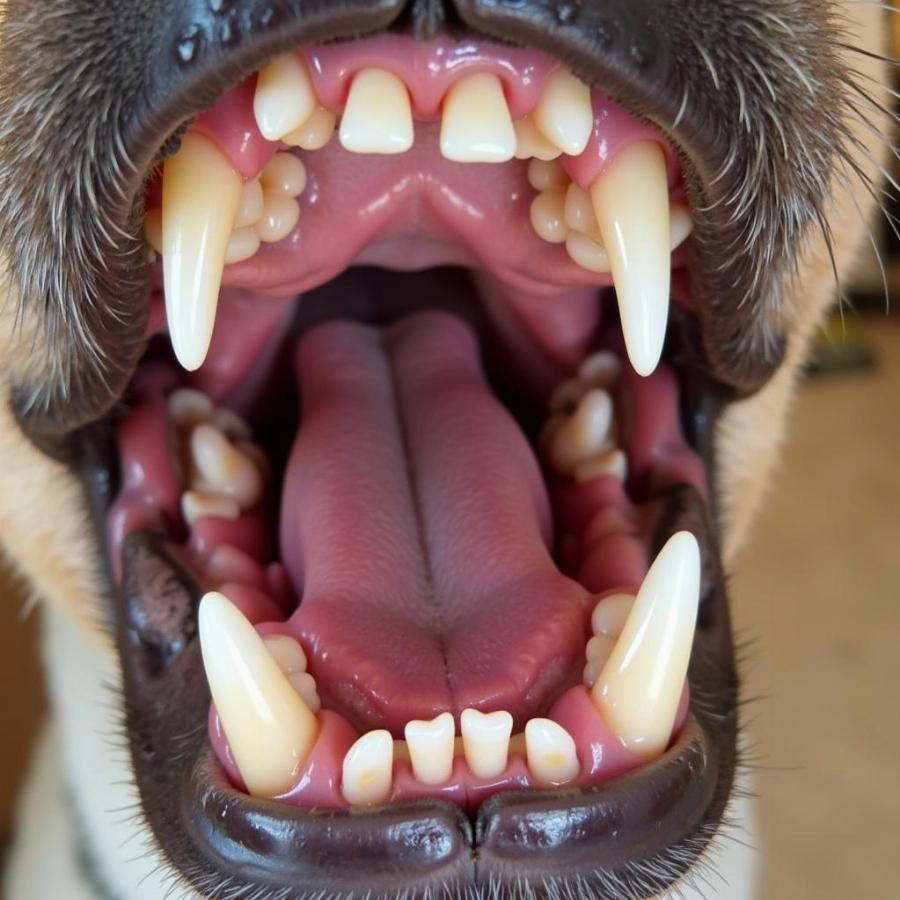Dental care is crucial for our furry companions, but the thought of anesthesia for teeth cleaning can be unsettling. How many dogs die from teeth cleaning? While extremely rare, it’s a valid concern for pet owners. This article will delve into the risks associated with canine dental procedures, discuss how to minimize them, and emphasize the importance of regular dental hygiene for your beloved dog.
Understanding the Risks of Anesthesia in Dog Teeth Cleaning
Anesthesia is a necessary component of professional dental cleanings for dogs as it allows veterinarians to perform a thorough examination and cleaning, including below the gum line. While generally safe, anesthesia does carry inherent risks, including adverse reactions to the drugs used and complications related to pre-existing health conditions. The actual number of dogs that die during or after teeth cleaning due to anesthesia is incredibly low, estimated to be between 0.05% and 0.17%. This means that for every 10,000 dogs undergoing dental cleaning under anesthesia, only 5 to 17 might experience a fatal outcome. It’s important to put this statistic in perspective. The risk is minimal, especially when compared to the potential health problems that can arise from neglecting dental hygiene.
Minimizing the Risks: Pre-Anesthetic Screening and Monitoring
Veterinarians take several precautions to minimize the risks associated with anesthesia. Pre-anesthetic bloodwork helps assess organ function and identify any underlying health issues that could increase the risk of complications. Physical examinations are also essential to evaluate the dog’s overall health. During the procedure, the dog’s vital signs, including heart rate, respiratory rate, and blood pressure, are continuously monitored. This allows the veterinary team to detect and address any changes promptly. Choosing a veterinarian experienced in canine dentistry and with advanced monitoring equipment further reduces the risks.
Why Regular Dental Care Is Essential, Despite the Risks
Despite the minimal risks associated with anesthesia, some pet owners might hesitate to subject their dogs to dental cleanings. However, the consequences of neglecting dental hygiene can be far more severe. Periodontal disease, a common ailment in dogs, can lead to tooth loss, painful infections, and even damage to vital organs like the heart and kidneys.
 Dog Showing Signs of Periodontal Disease
Dog Showing Signs of Periodontal Disease
Dr. Emily Carter, DVM, a renowned veterinary dentist, emphasizes, “The risk of complications from untreated dental disease significantly outweighs the minimal risk associated with anesthesia during a professional cleaning.”
Is There Anesthesia-Free Teeth Cleaning for Dogs?
While anesthesia-free dental cleaning is sometimes offered, it’s important to understand its limitations. This method only addresses surface tartar and plaque and doesn’t allow for cleaning below the gum line, where the most harmful bacteria reside. It also cannot address potential issues hidden beneath the gums. For a truly comprehensive cleaning, anesthesia is necessary.
What Can You Do at Home?
Regular brushing at home is crucial for preventing dental disease. Using dog-specific toothpaste and a toothbrush, aim to brush your dog’s teeth daily. Dental chews and treats can also help reduce plaque and tartar buildup. Remember, home care is a supplement to, not a replacement for, professional cleanings. You can learn more about keeping your dog’s teeth clean with coconut oil on our coconut oil and dogs teeth page. If you are looking for ways to freshen your dog’s breath, you can check our article on breath mints for dogs.
Conclusion
While the question, “how many dogs die from teeth cleaning?” is understandable, the actual risk is extremely low. Modern veterinary practices prioritize patient safety, utilizing pre-anesthetic screenings, advanced monitoring equipment, and experienced professionals to minimize risks. Regular dental care, including professional cleanings under anesthesia, is essential for your dog’s overall health and well-being. Don’t let fear of the extremely rare complications prevent you from providing your furry friend with the dental care they deserve. Talk to your veterinarian about developing a dental care plan tailored to your dog’s individual needs. You might also want to read about what to do if your dog has dogs with no teeth and whether are minties good for dogs.
FAQ
-
How often should my dog’s teeth be professionally cleaned? Most veterinarians recommend annual cleanings, but the frequency may vary depending on the individual dog’s needs.
-
What are the signs of dental disease in dogs? Bad breath, red or swollen gums, tartar buildup, difficulty eating, and excessive drooling can all indicate dental problems.
-
Are there any alternatives to anesthesia for dog teeth cleaning? While anesthesia-free cleanings are available, they are less effective than cleanings performed under anesthesia.
-
What can I do to improve my dog’s dental health at home? Brushing your dog’s teeth daily, providing dental chews, and feeding a dental-specific diet can help maintain good oral hygiene.
-
Is teeth cleaning painful for dogs? Under anesthesia, dogs do not feel any pain during the cleaning process.
-
How much does dog teeth cleaning cost? The cost varies depending on the location and the specific services required, but it typically ranges from a few hundred to over a thousand dollars.
-
What are the long-term effects of neglecting dog dental hygiene? Untreated dental disease can lead to tooth loss, painful infections, and even damage to vital organs.
More Questions?
For more information on dog dental health and other related topics, explore these articles on our website: brush dog teeth with coconut oil.
Beaut Dogs: Your Trusted Source for Canine Care
Beaut Dogs is your one-stop resource for all things related to canine companions, providing reliable and expert advice on dog breeds, health, training, and nutrition. When you need personalized support for your furry friend’s dental health or any other concern, don’t hesitate to reach out to our dedicated team at [email protected] (Email address). We’re here to help you provide the best care possible for your beloved dog. Visit https://beautdogs.com today!